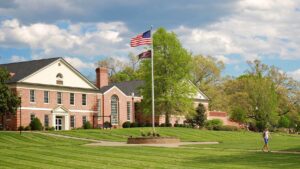Writer: Felipe Rivas
 2 min read February 2020 — Last March, the onset of the pandemic catalyzed changes in the higher education sector that tested and stressed institutional infrastructure, faculty agility and student resilience, among other factors. For Gardner-Webb University, the disruption allowed the institution to lean into its strengths and continue to best serve its students despite the coronavirus-related challenges.
2 min read February 2020 — Last March, the onset of the pandemic catalyzed changes in the higher education sector that tested and stressed institutional infrastructure, faculty agility and student resilience, among other factors. For Gardner-Webb University, the disruption allowed the institution to lean into its strengths and continue to best serve its students despite the coronavirus-related challenges.
In a time when educational institutions are navigating dwindling enrollment figures nationwide, Gardner-Webb University’s incoming 2020 freshman grew year-over-year, as the university doubled down on affordability efforts by freezing tuition increases and implementing various innovative financial incentives for the student body.
For the third year in a row, the university, located in Boiling Springs, about an hour away from Charlotte, announced this week a freeze on tuition for traditional undergraduate students enrolled in the Boiling Springs campus program. It will apply to incoming freshmen, transfer students and current undergraduates for fall 2021. This news follows growth in the 2020 freshman class. “Despite all of the uncertainties of COVID-19 and the financial stresses it has placed on families across our region, our entering freshman class in August of 2020 was 17.7% larger than last year’s entering freshman class,” President William Downs told Invest:.
The university’s location in Spartanburg County, South Carolina, and vast campus became one of its biggest assets in the face of pandemic. “The historic disadvantage of a small school in a small town such as Boiling Springs suddenly became our greatest advantage. We sit on 225 sprawling acres in a one-stoplight college town, with a 13:1 student-to-faculty ratio. We can construct a nice, secure bubble here,” Downs said.
For the spring 2021 semester, the university’s total spring enrollment, composed of undergraduate, nontraditional undergraduate and graduate programs, sits at approximately 3,300 students with a little over 1,100 students living on campus. This spring, the university welcomed students from the most diverse geographical areas in school history, with the student population representing over 23 foreign countries, 91 North Carolina counties and 43 states, the university reported.
As part of its recruitment process, the university has focused on attracting students from nearby counties. “We also rolled out some new, innovative financial incentives to help families of college-ready high-school seniors choose Gardner-Webb. We created the Foothills Commitment, in which we guaranteed to halve tuition for every admitted student from Cleveland, Gaston and Rutherford counties who wanted to live on campus,” Downs said.
This commitment to the regional community is paying off. “We saw a 65% increase in enrollment from these three counties. We have now extended that Foothills Commitment to Lincoln County, which is why we believe that we are going to have even greater success there by the fall of 2021,” Downs added. Additionally, the university launched an initiative to attract transfer students who may feel safer at a smaller institution. “We also launched what we call the “Transfer Your Future to Gardner-Webb” initiative. We know that there were a number of students out there in large public universities who might not have felt comfortable going back to a large public institution. As an incentive, if a student transfers from an accredited four-year university and comes to Gardner-Webb, we will pay for your room and board until you graduate,” he said.
Though the pandemic challenges abound for the educational sector at large, Gardner-Webb University looks forward to building on the positive growth it experienced in 2020. “The academic calendar is set and we plan to have spring break as scheduled, but we have reserved the right to change it if we need to. We plan to have face-to-face summer courses. The freshman class that arrived in August 2020 was the third-largest in the history of Gardner-Webb University. We are on pace to exceed that for the fall of 2021,” Down said.
A key focus for the university is creating stronger ties with the local and regional business community. “We want Gardner-Webb University to become an indispensable partner for our town, for our county, and for the broader region. We want more intellectual and entrepreneurial foot traffic coming onto our campus. We want to be seen as a meeting space where our Business School can be an incubator for those entrepreneurs who are looking to pull out from this economic malaise. We are going to launch an economic impact study to demonstrate Gardner-Webb’s impact not only on the town and the county but the region as a whole. Importantly, we intend to grow the visibility of Gardner-Webb University’s Charlotte campus, located at 8030 Arrowridge Boulevard, so that we can do more in partnership with our friends in Mecklenburg County,” Downs said.
For more information, visit:
https://gardner-webb.edu/
